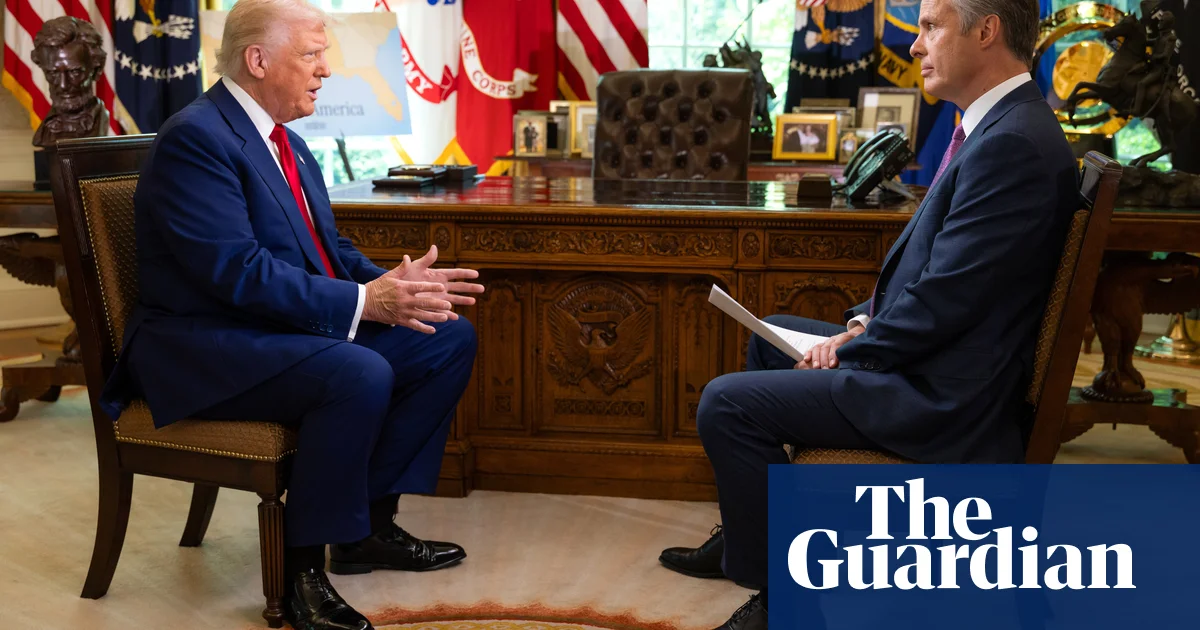Donald Trump lashed out at an ABC journalist in a tense TV interview to mark 100 days of his second term in office, in which among other confrontations he angrily pushed correspondent Terry Moran to agree with him that a doctored photo was actually real, telling him: “Why don’t you just say yes.”
The 40-minute interview in the Oval Office veered off course when Moran pressed Trump on the case of Kilmar Ábrego García, a Salvadorian man living in Maryland who was deported despite a protective court order. When Moran pointed out that the supreme court had ordered García’s return to the US, and suggested Trump had the power to comply by making a single phone call, the president bristled.
“I could,” Trump said – contradicting weeks of his administration’s insistence that he could not – but added: “I’m not the one making this decision. We have lawyers that don’t want to do this.”
“You’re the president,” Moran said, then after talking over each other, Trump said: “No, no, no, no. I follow the law. You want me to follow the law. If I were the president that just wanted to do anything, I’d probably keep him right where he is.”
“The supreme court says what the law is,” Moran pointed out.
The exchange deteriorated further when Trump insisted García had MS-13 tattoos on his knuckles, while Moran – after several times gently disagreeing and trying to move to a new topic – eventually pointed out that the image Trump was referring to had obviously been digitally altered.
“Why don’t you just say, ‘Yes, he does’ [have a gang tattoo] and, you know, go on to something else,” Trump said.
The US president added: “You do such a disservice … This is why people no longer believe the news, because it’s fake news.”
He then claimed he picked Moran to do the milestone interview “because frankly, I never heard of you”, and added: “Hey, they’re giving you the big break of a lifetime, you know – you’re doing the interview.”
Throughout, Trump stood by his controversial economic and immigration policies, even as Moran pressed him on potential consequences.
On his steep tariffs against China – which reached 145% on some goods – Trump dismissed widespread economic concerns about price increases for American consumers. “Everybody’s gonna be just fine,” the president insisted, despite analyses from Moody’s and other financial institutions projecting thousands of dollars in additional costs for American families.
“It’ll raise prices on everything from electronics to clothing to building houses,” Moran said.
“You don’t know that. You don’t know whether or not China’s gonna eat it,” Trump countered, claiming his tariffs were necessary to address trade imbalances that made the US economy “not sustainable”.
When it came to his proudest achievement in the first 100 days, Trump pointed to his border policies, claiming his administration had reduced illegal crossings by “99.9%”.
skip past newsletter promotion
Sign up to This Week in Trumpland
A deep dive into the policies, controversies and oddities surrounding the Trump administration
Privacy Notice: Newsletters may contain info about charities, online ads, and content funded by outside parties. For more information see our Privacy Policy. We use Google reCaptcha to protect our website and the Google Privacy Policy and Terms of Service apply.
after newsletter promotion
But, when questioned on whether he recognizes the legal procedures for deportations, Trump appeared to challenge established due process requirements. Asked if he acknowledged that under US law every person facing deportation is entitled to a hearing, Trump responded: “If people come into our country illegally, there’s a different standard,” contradicting decades of supreme court precedent establishing that constitutional protections extend to all persons on US soil.
Even when Moran cited concerns from the podcaster and Trump supporter Joe Rogan, who warned that deportations without due process might mean “we become monsters while we’re fighting monsters”, the president offered only vague assurances about being “careful” while doing “something that has to be done”.
On Ukraine, Trump described the ongoing conflict as “Biden’s war” while recounting his recent meeting with Ukraine’s president, Volodymyr Zelenskyy, at St Peter’s Basilica in Rome. Though he condemned Russia’s missile strikes on civilian areas, he also expressed belief that the Russian president, Vladimir Putin, “wants peace” – a claim at odds with Russia’s continued offensive operations.
When asked directly if he trusted Putin, Trump deflected: “I don’t trust you. I don’t trust a lot of people. I don’t trust you,” before adding that Putin “respects me”.
Trump also declined to clarify whether the US would continue military aid to Ukraine if peace negotiations fail, saying: “I want to leave that as a big, fat secret, because I don’t want to ruin a negotiation.”
When challenged about his use of presidential powers – including revoking security clearances and targeting law firms with regulatory threats – Trump defended his actions by claiming he had been “persecuted like no other president”.
And as the interview wrapped, Moran asked Trump directly about concerns he was becoming authoritarian, to which the president responded: “I would hate them to think that. I’m doing one thing: I’m making America great again.”
